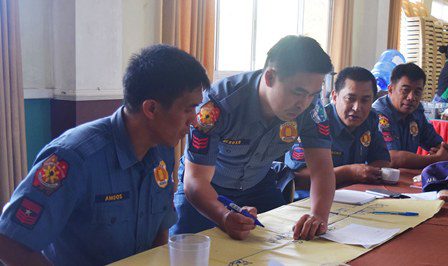CENRO-Baguio educates wildlife enforcers

BAGUIO CITY – Community Environment and Natural Resources Office (CENRO) Baguio through the Protected Area Management and Conservation Section (PAMBCS) educated police officers within its jurisdiction from the Municipalities of Itogon, Tuba, Kabayan, Bokod, Sablan, La Trinidad and Baguio City who were deputized as wildlife enforcement officers (WEO) pursuant to Republic Act No. 9147 or the Wildlife Conservation Resources and Protection Act recently.
CENRO-Baguio PAMBCS chief Glea Lagon said the learning development is part of their responsibility to inform the police officers on some environmental laws.
“The past years show that we have a good biodiversity to consider but how can we preserve the remaining natural resources we have now if we will not protect it.”
In a discussion delivered by Yolanda Ruperto from DENR-CAR Conservation and Development Division, she explained that it is the policy of the State to conserve the country’s wildlife resources and their habitats for sustainability. RA 9147 is not new but many police officers are still not knowledgeable about the law.
Ruperto expounded that the Act is enforceable for all wildlife species found in all areas of the country, including protected areas under Republic Act No. 7586, otherwise known as the National Integrated Protected Areas System (NIPAS) Act, and critical habitats. It is also applicable to exotic species which are subject to trade, are cultured, maintained and/or bred in captivity or propagated in the country.
She explained the prohibited acts such as killing and destroying wildlife species except if used for religious or indigenous rituals, if afflicted with incurable disease, to prevent the happening of an imminent danger, or if permitted for study or research.
She added that it is a violation if one will inflict injury which would cripple and/or impair the reproductive system of wildlife species; effect any of the following prohibited acts in critical habitat; dump waste products detrimental to wildlife; and squat or occupy any portion of the critical habitat.
Other prohibited acts are mineral exploration and/or extraction; burning; logging; quarrying; introduction, reintroduction or restocking of wildlife resources; trading of wildlife; collecting, hunting or possessing wildlife, their by-products and derivatives; gathering or destroying of active nests, nest trees, host plants and the like; maltreating and/or inflicting other injuries; and transporting of wildlife.
Fine and punishment will be imposed by the court to violators as prescribed by the law.
The WEOs assured also to conduct information drive on RA 9147 in schools and in different communities. They have also presented how they could prevent illegal acts within their jurisdiction through regular patrolling and community engagement.
CENR officer Rainier Balbuena added that as WEOs they have a big role in enforcing the law as well as guarding the environment against any illegal acts.
“We can make a change simply by way of prudently watching our environment for a cause and we will not wait for the time that our environment will be destroyed to the detriment of our future generation,” Balbuena said. IAN JEFREY ADDATU / ABN
CAR lawmakers elated as support to autonomy grows
April 21, 2018
Community Billboard
DID YOU KNOW
June 14, 2025
NBI EXPRESSES FULL SUPPORT FOR NATIONAL ACTION PLAN FOR UNITY, PEACE, AND DEVELOPMENT 2025-2028
June 14, 2025
ONE HAND ON THE PLOUGH, ONE HAND ON THE TRIGGER
June 14, 2025
NATIONAL DIRECTOR LUSTRIA JR. LEADS “ADIVAYAN” WITH IBALOI SAAD FISHERFOLK BENEFICIARIES IN TUBLAY, BENGUET
June 14, 2025
E-WASTE BIN LAUNCHED AT UP BAGUIO
June 14, 2025





